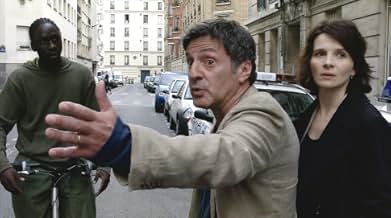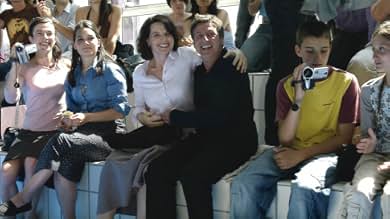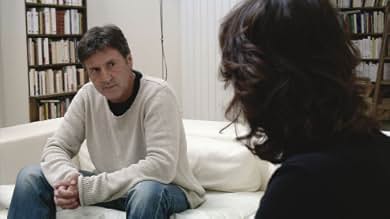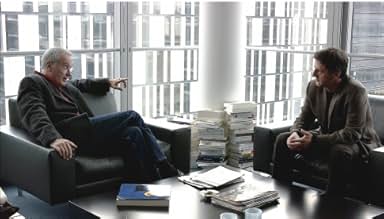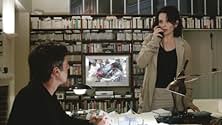A married couple is terrorized by a series of surveillance videotapes left on their front porch.A married couple is terrorized by a series of surveillance videotapes left on their front porch.A married couple is terrorized by a series of surveillance videotapes left on their front porch.
- Awards
- 29 wins & 37 nominations
- Director
- Writer
- All cast & crew
- Production, box office & more at IMDbPro
Storyline
Did you know
- TriviaThere is no music, save for the theme on George's show, and background music at Anne's publishing party.
- GoofsDuring the tape where Georges pulls up in his car and parks at night the headlights clearly cast a huge distinct shadow of the camera on the wall.
- Quotes
Georges Laurent: Isn't it lonely, if you can't go out?
Georges's Mom: Why? Are you less lonely because you can sit in the garden? Do you feel less lonely in the metro than at home? Well then! Anyway, I have my family friend... with remote control. Whenever they annoy me, I just shut them up.
- Crazy creditsThe opening credits appear over a shot of the husband and wife's house, but they appear one by one and in rows. By the time the credits are over they are all shown together, much like they would on a poster or in the credits section of a movie trailer.
- ConnectionsFeatured in Smagsdommerne: Episode #3.13 (2006)
Featured review
"Caché (Hidden)" uses the visual power of film to create an escalating examination of contemporary paranoia and personal global responsibility the way Francis Ford Coppola's 1974 film "The Conversation" did with sound and fictional criminals.
Writer/director Michael Haneke plays visual tricks on the audience as voyeurs from the opening shot, much as he did with "Code Inconnu," as he coyly plays with technology, building on the pervasive surveillance potential of our times.
The comfortable upper middle class life of married intellectuals Daniel Auteuil and Juliette Binoche is more and more disrupted by spooky video and drawings from some kind of stalker. With a bit heavy-handed constant background TV news coverage about terrorism and other violence in the MidEast, as well as too much irony that Auteuil works on TV (evidently in yet another book discussion show like the central narcissist in "Look At Me (Comme une image)"), race is quickly introduced as a flash point in contemporary Paris from a brief street confrontation and reinforced with Auteuil's flashback dreams of his youth.
While the political angles are obvious, the Hitchcockian tension is very effectively built up (though not narratively resolved even as some secrets are revealed that lead to other inscrutabilities), not just as we see Auteuil repeatedly lie and Binoche practically disintegrate from nerves, but through sudden violence.
While we never understand who all is lying and who isn't, the film further plays on the truth that visual images don't in fact communicate the reality of a situation and can be misleading about relationships, particularly once paranoia has destroyed trust. The film also raises the question if people change their behavior if they know they are being watched and that you can't really hide from your past. Cynically, but perhaps honestly as opposed to in "Crash," here there is no easy resolution of acceptance of guilt and responsibility in personal lives any more than there is in the legacy of colonialism and racism.
Not only is the past never dead, but the film keeps repeating issues of not just am I my brother's keeper, but the sins of the father are revisited on the sons, such that it's important to keep watching even as the credits start to appear at the end (there was much shouting when some folks got up to leave too soon, blocking cryptic clues to those behind them).
The subtitles are very poorly done, with many scenes having them white on white, instead of the much easier to read yellow.
Writer/director Michael Haneke plays visual tricks on the audience as voyeurs from the opening shot, much as he did with "Code Inconnu," as he coyly plays with technology, building on the pervasive surveillance potential of our times.
The comfortable upper middle class life of married intellectuals Daniel Auteuil and Juliette Binoche is more and more disrupted by spooky video and drawings from some kind of stalker. With a bit heavy-handed constant background TV news coverage about terrorism and other violence in the MidEast, as well as too much irony that Auteuil works on TV (evidently in yet another book discussion show like the central narcissist in "Look At Me (Comme une image)"), race is quickly introduced as a flash point in contemporary Paris from a brief street confrontation and reinforced with Auteuil's flashback dreams of his youth.
While the political angles are obvious, the Hitchcockian tension is very effectively built up (though not narratively resolved even as some secrets are revealed that lead to other inscrutabilities), not just as we see Auteuil repeatedly lie and Binoche practically disintegrate from nerves, but through sudden violence.
While we never understand who all is lying and who isn't, the film further plays on the truth that visual images don't in fact communicate the reality of a situation and can be misleading about relationships, particularly once paranoia has destroyed trust. The film also raises the question if people change their behavior if they know they are being watched and that you can't really hide from your past. Cynically, but perhaps honestly as opposed to in "Crash," here there is no easy resolution of acceptance of guilt and responsibility in personal lives any more than there is in the legacy of colonialism and racism.
Not only is the past never dead, but the film keeps repeating issues of not just am I my brother's keeper, but the sins of the father are revisited on the sons, such that it's important to keep watching even as the credits start to appear at the end (there was much shouting when some folks got up to leave too soon, blocking cryptic clues to those behind them).
The subtitles are very poorly done, with many scenes having them white on white, instead of the much easier to read yellow.
- How long is Caché?Powered by Alexa
Details
- Release date
- Countries of origin
- Official sites
- Language
- Also known as
- Caché (Hidden)
- Filming locations
- 49 Rue Brillat-Savarin, Paris 13, Paris, France(Georges' house)
- Production companies
- See more company credits at IMDbPro
Box office
- Budget
- €8,000,000 (estimated)
- Gross US & Canada
- $3,647,381
- Opening weekend US & Canada
- $57,010
- Dec 25, 2005
- Gross worldwide
- $16,197,824
- Runtime1 hour 57 minutes
- Color
- Sound mix
- Aspect ratio
- 1.78 : 1
Contribute to this page
Suggest an edit or add missing content


